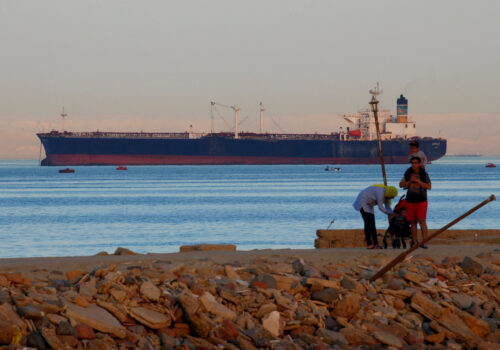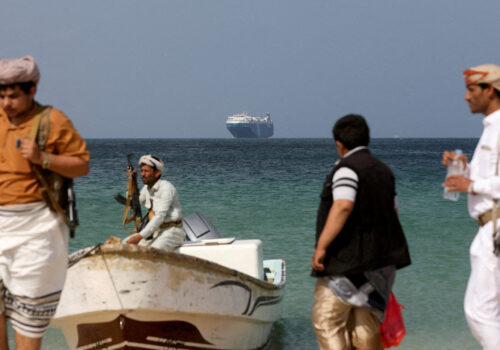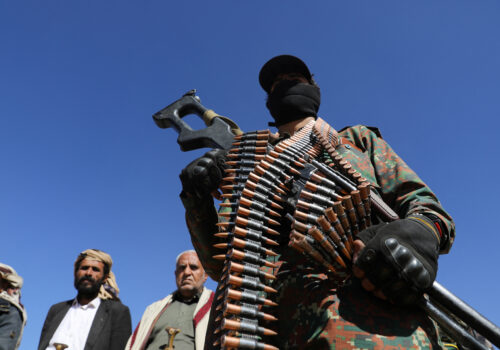I’m a Yemeni minister and I believe the Houthi designation is not enough
In January 2021, the Donald Trump administration designated the Houthi militia as a terrorist organization. The decision was a painful blow to the Houthis and has undermined their capabilities and limited their terrorist activities. However, the act sparked a wave of criticism concerning possible repercussions for international de-escalation efforts, the future of the political process in Yemen, and the delivery of humanitarian aid and food supply chains to areas under Houthi control.
A month after President Joe Biden took office in 2021, the designation was revoked due to those very concerns. Nonetheless, these efforts to advance the path of peace in Yemen did not pay off, and the political, economic, and humanitarian situation deteriorated in an unprecedented manner in the three years since that revocation.
As a result of recent attacks by the Houthis on international shipping and trade lines in the Red Sea, the Bab el-Mandeb Strait, and the Gulf of Aden, the Biden administration reviewed its decision and redesignated the Houthis on January 17. The voices against this measure disappeared after it became clear that the Houthis present a danger not just to Yemen and the region, but also to the world. This danger exists on several levels.
First, the US decision to revoke the designation sent the wrong signals to the Houthis and was considered a green light to continue their escalation. At the same time, Iran saw it as permission to exercise more influence and dominance over the region. Nearly a month after the United States revoked the designation in 2021, the Houthis escalated by launching a series of attacks using ballistic missiles and drones manufactured in Iran against energy facilities in several Saudi cities.
More significantly, the Houthis continued to commit crimes and violations against civilians in the areas under their control, and hostilities extended to areas under government control. The group thwarted the extension of the United Nations (UN) truce in 2022 and, at the behest of Iran, it undermined de-escalation and peace efforts. The Houthis have also breached United Nations Security Council resolutions related to the Yemeni crisis. Taking advantage of the international community’s keenness to resolve the crisis peacefully, the Houthis regrouped, mobilized their fighters to the battle fronts, and accumulated weapons and military technology smuggled from Iran.
Additionally, the economic situation has deteriorated, and the humanitarian suffering has worsened throughout Yemen since the terrorist designation was revoked. The Houthis have since escalated their pressure on and extortion of international organizations.
In November 2023, the Houthis expelled the deputy representative of the High Commission for Human Rights (OHCHR), Safireddine Sayed. The expulsion is not unprecedented, coming three years after the Houthis denied entry to the commission’s representative in 2019.
They have also detained several employees of the United Nations and international organizations—including Prodigy Systems and the OHCHR—and forcibly disappeared them to prevent them from performing their mandate. In one instance, they even tortured to death an employee of Save the Children.
SIGN UP FOR THE THIS WEEK IN THE MIDEAST NEWSLETTER
Houthis also continued to seize cash and food aid, divert funds and supplies to their members, sell relief materials, and use the money to attract and mobilize fighters and finance their wars. This prompted several organizations to suspend their operations and move their headquarters to the interim capital, Aden. The United Nations World Food Programme also announced in December 2023 that it would suspend programming in areas under Houthi control.
The Houthis also continue to obstruct all government initiatives and solutions, including the UN mechanism, to allocate revenues from the Hodeidah port to pay the salaries of public servants in areas under Houthi control. Houthis also continued the siege of Taiz.
The Houthis also imposed an economic war on the government by obstructing oil exports and the delivery of cooking gas shipments from Marib governorate. Additionally, they imposed levies on goods coming from the liberated areas to disrupt the port of Aden, which harmed the state’s budget, affected the government’s ability to fulfill its obligations in the liberated areas, and paralyzed its ability to pay the salaries of public servants.
Since the beginning of November 2023, the Houthi militia has launched a wave of maritime piracy and terrorist attacks on commercial ships and oil tankers in international shipping lanes, pressuring Israel to lift its blockade on the Gaza Strip.
The Houthis have ignored the disastrous repercussions of these attacks on the prices of shipping and insurance fees on ships entering Yemeni ports, as well as their effects on the prices of food and consumer goods. Their actions threaten to double the burden on Yemenis, who depend on imports to cover 90 percent of their needs.
The Biden administration’s decision to revoke the Houthi terrorist designation contributed to the complexity of the Yemeni crisis, prolonging the war, exacerbating human suffering, and pushing peace beyond the reach of the Yemenis. This decision was also a gift to Iran and helped strengthen its subversive policies and terrorist activities in both Yemen and the region.
To avoid replicating the same scenario, a new approach must be taken to counter the Houthis.
Forming alliances to protect international trade and launching limited strikes against the Houthis will not solve the problem. The international community must comprehensively review how it deals with the Yemeni issue to avoid making the same mistakes. Treating the symptoms is not enough. It must address the root causes of the problem: the Houthis.
It is the responsibility of the international community to coordinate a response to Houthi activities and to force them to abandon their terrorist tactics. Beyond designating the Houthis as a terrorist organization, governments must dry up the militia’s financial, political, and media resources. This includes restricting trade, imposing sanctions on Houthi leaders, freezing their assets, and banning travel. These measures will not jeopardize the channels of dialogue necessary for any future peaceful solution, but will still pressure the Houthis.
International partners must also support the Yemeni Presidential Leadership Council, led by President Rashad Muhammad al-Alimi. The Yemeni government requires political, humanitarian, and military support to restore the country. Failure to address the root causes of the conflict will lead to replicating historical mistakes that have been repeatedly committed. These recommended approaches can establish security and stability in all Yemeni territories and stop Houthi terrorist activities that threaten regional and international peace.
Moammar Al-Eryani is the minister of information, culture, and tourism of the Republic of Yemen.
Further reading
Thu, Feb 8, 2024
Houthi attacks on ships in the Red Sea add to Egypt’s economic troubles
MENASource By Shahira Amin
The decline in Suez Canal revenues has put further strain on Egypt's already faltering economy at a time when the country faces a severe foreign currency shortage.
Thu, Jan 25, 2024
Houthi attacks in the Red Sea hurt global trade and slow the energy transition
New Atlanticist By William Tobin, Joseph Webster
Recent attacks on commercial shipping in the Red Sea are a reminder that a major disruption to freedom of navigation would hold many negative consequences.
Wed, Jan 17, 2024
The Houthis are again ‘specially designated global terrorists.’ Here’s what that means.
New Atlanticist By
The Biden administration just returned the Iran-backed group in Yemen to the US terrorist list, but it did not designate the Houthis a foreign terrorist organization. Atlantic Council experts explain what the decision means.
Image: Protesters, including Houthi supporters, rally in solidarity with Palestinians in Gaza, amid the ongoing conflict between Israel and the Palestinian Islamist group Hamas, in Sanaa, Yemen February 23, 2024. REUTERS/Khaled Abdullah


